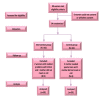Effect of the Sacred Hour on Postnatal Depression in Traumatic Childbirth: a Randomized Controlled Trial
- PMID: 31249815
- PMCID: PMC6589481
- DOI: 10.15171/jcs.2019.010
Effect of the Sacred Hour on Postnatal Depression in Traumatic Childbirth: a Randomized Controlled Trial
Abstract
Introduction: the implementation of the baby's nine instinctive stages as a sacred hour after birth is very effective in starting breastfeeding. About half of newly delivered mothers have reported a traumatic childbirth experience often associated with mental health problems. The present study aimed to examine the effect of the sacred hour on the depression in traumatic childbirths. Methods: In this clinical trial, 84 mothers who had experienced a traumatic childbirth were randomly allocated into the intervention (n = 42) and control (n = 42) groups. The intervention group received sacred hour (baby's nine instinctive responses), but the control group received only the routine care. Postnatal depression was evaluated as primary outcome at 2 week, 4-6 week and 3 month intervals after the delivery. The data were analyzed using t test, chi-square test and the repeated measures analysis of variance. Results: The results showed that the marginal total mean (SD: standard deviation) scores of depression in the intervention and control groups were 7.5 (2.6) and 9.6 (2.6); therefore, the mean difference (95% CI) between the groups (-2.1, (-3.2,-0.95)) was significant. Conclusion: The implementation of the sacred hour is recommended as a preventive approach to reduce the postnatal depression in women with a traumatic childbirth experience.
Keywords: Breastfeeding; Childbirth; Postnatal depression; The sacred hour; Traumatic.
References
-
- Beck CT, Dnsc C, Driscoll JW, Watson S. Traumatic childbirth. 1st ed. United Kingdom: Routledge; 2013.
-
- Abdollahpour S, Mousavi SA, Motaghi Z, Keramat A, Khosravi A. Prevalence and risk factors for developing traumatic childbirth in Iran. Journal of Public Health. 2017;25(3):275–80. doi: 10.1007/s10389-016-0783-y. - DOI
-
- Thune-Larsen K-B, Mosller-pedersen K. Childbirth experience and postpartum emotional disturbance. J Reprod Infant Psychol. 1988;6(4):229–40.
LinkOut - more resources
Full Text Sources


